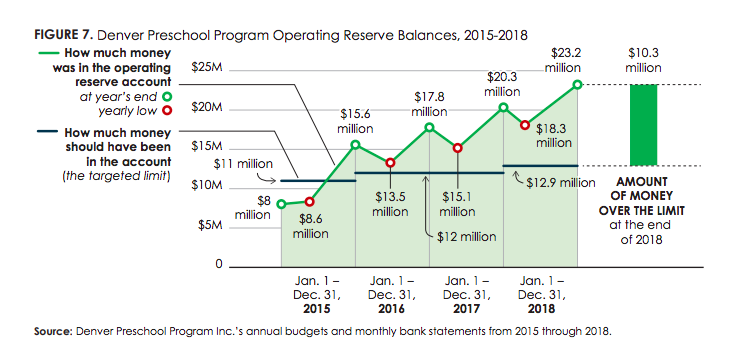“Denver Preschool Program Inc. has accumulated over $20 million in unspent Denver preschool tax revenue but has no formal plan for this operating reserve,” he wrote. According to O’Brien, the excessive amount the Denver Preschool Program has been saving is likely harming its ability to expand access to quality preschools for children.
Elsa Holguín, president and CEO of Denver Preschool Program, wrote in an email to Westword that the organization has been saving funds to ensure its financial stability in the face of a possible downturn in the economy, as well as to start up a new "Gap Scholarship" program. The preschool program also sent out a fact sheet emphasizing that there was no evidence of malfeasance.
The Denver Preschool Program is funded by a .15 percent sales tax, approved by Denver voters in 2006 and reauthorized in 2014 to extend to 2026. It offers families tuition credits for high-quality preschools based on a sliding scale according to the family’s income, the quality of the preschool, and the length of day the child attends. The program has provided $80 million in tuition support to more than 41,000 children since it was founded.

According to the auditor, the Denver Preschool Program's reserves were higher than they should have been throughout the past four years.
Denver Auditor
Holguín wrote in an email to Westword that the Denver Preschool Program "respectfully disagree[s]" with the auditor's interpretation of the city's ordinances. "DPP’s budgeting practices do comply with ordinance and DPP’s contract with the city. Both the ordinance and the contract support the financial model currently in place," she continued. The ordinance states that "at least 93 percent of Denver preschool tax revenue received by the corporation in any year shall be used" for programmatic purposes apart from reserves, but, Holguín says, "The contract does not require all revenue to be spent in the year it was received, and DPP has the ability to carry forward revenue and establish a reserve."

The graph shows that the Denver Preschool Program is accumulating unspent tax revenue.
Denver Auditor
The auditor also showed that the organization invested the reserve dollars in a commercial money market account, which yielded about $50,000 from 2015 through 2018. The analysis showed the organization could have brought in as much as ten to twenty times that if it had invested in a different portfolio.
The audit makes the case that the organization could have expanded its programs to serve more children if it used the funds responsibly. It also faults the City of Denver and the organization’s board of directors for not sufficiently providing financial oversight to the program.
As the audit points out, part of the problem may be that many eligible Denver families aren’t taking advantage of the program.
"Currently, 60% of eligible 4-year-olds participate in a high-quality preschool program because of DPP. This participation rate is double the national average, a fact that should make every Denver resident proud. That said, there is room for growth," Holguín wrote. "DPP is one of the most successful programs of its kind and is a model for other municipalities around the country."
O’Brien recommended that the program get a fully functioning reserves and investment policy, alongside other best practices for strengthening its fiscal responsibility and accountability. Denver Preschool Program agreed to the recommendations by the spring of 2020. Tracy Breckenridge, a spokesperson with the city's Office of Children's Affairs, sent Westword an email statement explaining that the office will be "involved in discussions with the Denver Preschool Program related to the development of clear policies for investments and reserves."












